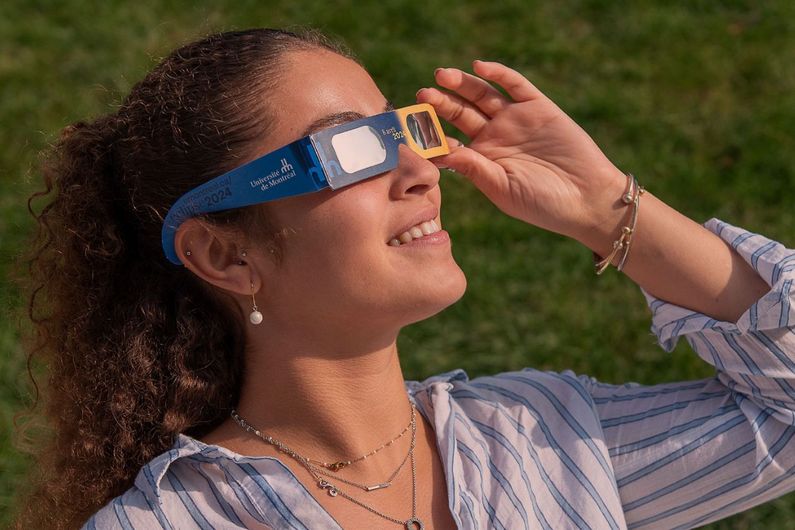The 2024 solar eclipse: enjoy the show at UdeM!
- UdeMNouvelles
03/15/2024
- Marilou Garon
On April 8, a total solar eclipse will cross southern Quebec, and everyone at Université de Montréal is invited to come view this unique event on campus.
Quebec's astronomical event of the century is happening on the afternoon of April 8: the moon will pass between the Earth and the sun, making the skies go dark for a minute or more.
Université de Montréal is an ideal place to view this rare celestial phenomenon, and as members of our community you're invited to come join in this once-in-a-lifetime opportunity – there won't be another total solar eclipse over southern Quebec until 2106.
UdeM will mark the occasion with a big event on our main campus. Three thousand people will be able to watch the eclipse outdoors at the CEPSUM stadium, while listening to live commentary by science journalist Marie-Pier Élie.
Faculty members and researchers from a variety of disciplines – physics, veterinary medicine, anthropology and more – will also speak, and for added fun there will be activities and games to get people moving, as well as a photo booth.
For those who can't make it to the CEPSUM, the event will be broadcast on UdeM's student radio station, CISM 89.3 FM. UdeM's Solar eclipse website can also direct you to other good spots on campus to view the eclipse.
Four of our campuses – Montreal, MIL, Saint-Hyacinthe and Brossard – are located in what's known as the "path of totality," a 200-kilometre-wide strip where the sun will fully eclipse the moon. Outside this area, the eclipse will only be partial.
It depends where you'll be
How many minutes should you expect the eclipse to take? It depends where you'll be you're watching from.
"The closer you are to the middle of the path of totality, the longer the total eclipse will last," says Marie-Eve Naud, an astrophysicist at UdeM and the scientific coordinator for outreach and education at the Trottier Institute for Research on Exoplanets (iREx).
"Since the MIL campus is furthest north, the eclipse will last one minute on that site. Over at the CEPSUM, the eclipse will be about 13 seconds longer. In Saint-Hyacinthe, the show will last nearly two minutes, and viewers in Brossard will get a few additional seconds of showtime because that campus is located closest to the path of totality's centre line."
Is it worth driving across town for a few extra seconds of darkness?
"It may seem hard to believe," said Naud, "but anyone who has seen a total solar eclipse before will tell you it's definitely worth it!"
Drawn to the rarity
People are drawn to total solar eclipses because they're so rare. In 2017, 1.6 million people took in the one visible from South Carolina, including astrophysicist Nathalie Ngugen-Quoc Ouellette, deputy director of the Mont-Mégantic Observatory and iREx.
"It's the closest I've come to a spiritual experience," she recalled.
"It's completely different from a partial eclipse. During a total eclipse, you can take off your eclipse glasses and observe the solar corona with the naked eye. Seeing a huge black hole in the sky is like slipping into another dimension."
Watch Nathalie Nguyen-Quoc Ouellette talk about her experience (French only).
Even if it's cloudy or rainy, you'll still witness the eclipse, added Naud: "If you're in the path of totality, you'll see the sky get progressively darker, regardless of the weather conditions. You'll also notice a drop in temperature."
Observing the impact on animals can also be interesting: they change their behaviour and switch to their usual "end-of-day" routine, at least for a short while. For humans, too, the impact can be strong, especially when people view the eclipse together.
"People need to be with people; belonging to a group is a fundamental human need," said Roxane de la Sablonnière, an UdeM professor of social psychology.
"Individuals who weren't previously part of the same group can quickly forge ties simply because they shared a common experience."
A special website
The university's Solar eclipse website is where you'll find complete details about the April 8 event, including information on where to pick up a pair of eclipse glasses. Students and members of the teaching, administrative and support staffs can reserve a spot for viewing the eclipse at the CEPSUM stadium; gates open at 1:30 p.m.
Activities for parents of young children
Watch E comme Éclipse, a French-language video series created by Marie-Eve Naud and the Trottier Institute for Research on Exoplanets.
What to read
Marie-Eve Naud recommends the popular new French-language book Éclipse: quand le soleil fait son cirque, by Quebec science educator Julie Bolduc-Duval and science journalist Joël Leblanc.












